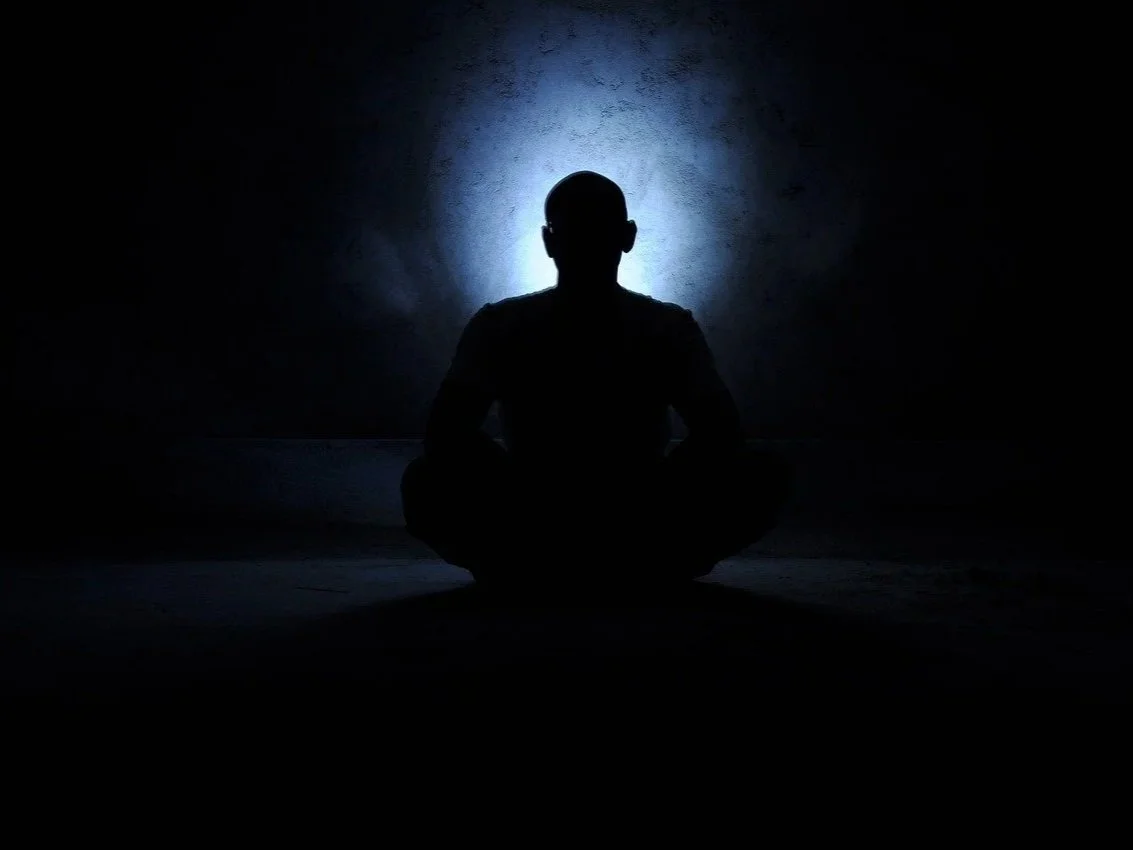Signs of Spiritual Death and How to Reconnect
Written by Kirsti Formoso,
MSc. Transpersonal Psychology, BSc. Psychology
Feeling disconnected, empty and spiritually dead is tough, but it’s not permanent. And no matter how dark things might feel today, you can turn it around. We are spiritual beings in physical bodies. Reconnecting with our spiritual selves might be challenging, but our spiritual essence is more enduring than any feeling.
WHAT DOES SPIRITUAL DEATH MEAN?
Spiritual death is the profound feeling of losing your connection to God, Source, Oneness or the deeper ground of being. It is often accompanied by a heavy inner darkness, profound isolation, and a painful sense of spiritual desolation.
UNDERSTANDING SPIRITUAL DEATH
The concept of spiritual death is rooted in Christian theology, where it is seen as a state of separation from God, caused by sin and rebellion. This idea is found in other religious traditions as well.
However, you don't have to be religious to feel spiritually dead. Many people in the West feel disconnected from their spiritual selves, a higher power, or a deeper sense of meaning and purpose.
Maybe, as we collectively turned away from religion in the last few decades and instead looked for happiness and fulfilment in other things, it left a kind of vacuum inside. Disconnected from our communities and our spiritual dimension, we leaned more and more into the external world of stuff.
As we did this, the vacuum only grew. We felt increasingly disconnected and empty, and in our desperation for meaning, we began striving harder—for success, power, and status.
Capitalist societies feed on this longing. They turn our sense of not being enough (born from that spiritual disconnection) into fuel for endless consumption and competition. The ego's drive to be more—more successful, more important, more visible—is constantly stoked.
In that pursuit, we often neglect qualities like intuition, stillness, and inner exploration. These quieter aspects of ourselves are overshadowed by the external chase. Our spiritual dimension gets pushed further into the background.
To make matters worse, spirituality is often dismissed as irrational or “woo-woo,” which discourages people from exploring that part of themselves—or from sharing it when they do.
Spiritual awakening and transcendence are our natural and innate direction, but all too often are replaced with spiritual death.
Reclaiming that inner space may be the first step toward healing the quiet ache we often mistake for something the outside world can fix.
SIGNS AND SYMPTOMS OF SPIRITUAL DISCONNECTION
Signs of spiritual disconnection include;
Feeling dead, empty, numb, hollow or unfulfilled.
Having a lack of purpose and meaning in life.
A sense of separation from God, universal consciousness, the divine, sacred, or spirit.
A lack of awe, presence, joy or peace.
The feeling of being stuck in a state of spiritual death.
Hedonistic lifestyle.
Constant scrolling, bingeing, overworking, or substance use.
Superficial relationships.
Disconnection, distraction or suppression of feelings.
Feeling disconnected from nature.
Feeling disconnected from others (family, friends, tribe, community, ancestors, spirit guides).
You define your worth by status, achievements, appearance, or possessions.
DARK NIGHT OF THE SOUL
Spiritual death and dryness are closely linked with the harrowing process called the Dark Night of the Soul. Spiritual death is one symptom often found in people who are going through a Dark Night of the Soul. However, a Dark Night of the Soul always follows a spiritual high, such as a mystical experience.
These dark periods of spiritual desolation arise from the post-awakening collapse of the egoic identity and sense of reality. In contrast, spiritual death or dryness doesn’t need an enlightening or mystical experience to precede it.
WHAT CAUSES SPIRITUAL DEATH
Disconnection from our spiritual aspect — that deep, intuitive sense of meaning, purpose, or connection to something greater — can be caused by a variety of internal and external factors. Here are some of the most common:
🔶 1. Over-Identification with the Material World
Constant focus on achievement, possessions, or external validation can drown out the inner life.
When we’re busy chasing success, status, or security, our spiritual needs often get sidelined.
The pursuit of material wealth and worldly desires can distract us from spiritual growth.
🔶 2. Trauma or Emotional Pain
Painful experiences can cause us to shut down emotionally and spiritually as a form of self-protection.
The pain and suffering in the world can sometimes make us question God’s existence and the meaning of life. This can lead to a decline in our spiritual life and a sense of hopelessness.
We may lose trust in life, God, or the universe, leading to a sense of separation.
🔶 3. Cultural or Societal Conditioning
Many societies prioritise logic, productivity, and science over intuition, stillness, and inner exploration.
Spirituality may be dismissed as irrational or “woo-woo,” discouraging people from exploring that part of themselves.
🔶 4. Religious Wounding or Dogma
Negative experiences with organised religion — like guilt, fear, or judgment — can cause people to reject spirituality altogether.
These experiences often damage our relationship with God or our higher power, and our spiritual life begins to wither. This disconnection can make us feel dead inside, as if our soul is no longer in tune with the divine presence that sustains us.
This often creates confusion between religion and personal spirituality.
🔶 5. Mental Overactivity and Disconnection from the Body
Living constantly in the mind — overthinking, analysing, planning — disconnects us from the present moment.
Since spiritual awareness often arises through stillness, presence, and embodiment, this creates a barrier.
🔶 6. Addictions and Numbing Behaviours
Using substances, screens, or distractions to avoid discomfort can cloud awareness of our spiritual dimension.
These behaviours often arise as a response to inner emptiness — ironically deepening the disconnect.
The world is full of temptations that can distract us from our higher purpose. When we give in to hedonistic desires, we stray from the path of integrity and dwell in spiritual darkness.
🔶 7. Lack of Silence and Solitude
Spiritual connection thrives in spaces of reflection, silence, and stillness.
Constant stimulation from media, noise, and busy schedules can block the subtle voice of the soul.
Self-reflection and awareness of our shadows, behaviours, beliefs, and weaknesses are essential for spiritual growth. Without them, our relationship with ourselves and others suffers. We may feel disconnected and disenchanted with the spiritual path.
🔶 8. Absence of a Spiritual Community
A supportive spiritual community can nourish spiritual growth and keep us connected to our spiritual selves. Without it, we may feel isolated and disconnected, leading to a decline in our spiritual life and a sense of spiritual death.
RECONNECTING WITH OUR SPIRITUAL DIMENSION
Spiritual death and disconnection aren’t permanent. It's a feeling, and maybe it's been hanging around for a while. It's trying to communicate to you that something isn't right in your internal or external world.
It's asking you to take action. It's asking you to go inward, into the still silence of beingness. But for many people, that's a scary place. One they've been running from for a long time.
We can take little steps to reconnect with our inner selves gradually. Day by day, moment by moment, we can reconnect with source or God or our higher selves. In little ways.
You go at your own pace. You take one step towards God, and God will take one step towards you. You only have to do half the work when finding your spiritual path.
And gradually, the feelings of being spiritually empty will be replaced with feelings of being fulfilled, connected, and spiritually alive.
LITTLE STEPS TO FINDING THE STILLNESS WITHIN
Choose a few things from this list and set a reminder on your phone to do them each day.
Spend time in silence – Start with just 3 or 5 minutes a day of quiet, no phone, no music, no distractions. Let your mind settle without trying to force it.
Go for slow walks in nature – Not for exercise, not with a podcast — just walking, observing, and letting yourself be present.
Journal without an agenda – Write freely about what you’re feeling or noticing, even if it seems mundane. This builds awareness of your inner life.
Practice mindful breathing – Just a few deep breaths with attention can shift you into a more grounded, connected state.
Read poetry or philosophy – Short, reflective writings (like Rilke, or Marcus Aurelius) can help you tap into a deeper layer of meaning.
Engage in creative play – Draw, dance, make music, or play with ideas without needing a “productive” outcome.
Limit overstimulation – Take breaks from screens, constant noise, and endless input to allow space for inner reflection.
Create a small ritual – Light a candle, make tea slowly, or take a few moments each morning to check in with yourself — anything that adds intention to your day.
Practice gratitude – Write down or think of one thing each day that brought a sense of connection, awe, or peace.
Talk about it – Share your thoughts or longings with someone open-minded. Feeling spiritually dead can be isolating — but it’s more common than it seems.
GETTING SUPPORT IN RECLAIMING YOUR SPIRITUAL SELF
Finding your spiritual path can be challenging and lonely. But whether you're religious, spiritual-but-not-religious, or simply feeling disconnected, support is available to help you reconnect with your spiritual self.
In our secular capitalist world, a spiritual life can feel impossible, and our spiritual journey can feel uncharted. Opportunities to connect to something deeper than ourselves can be elusive. And it can be difficult to know where to turn for support. It’s common to feel lonely or like you have no one to talk to about such things.
Finding a religious or spiritual community, an awakening group, or some other community for support can provide just what you need to maintain a healthy spiritual life.
Even joining a yoga class that includes breathwork or an 8-week Mindfulness-Based Stress Reduction course can help you start to build a spiritual practice and community. Try out different churches, organisations and groups until you find one that resonates with you.
If you feel that it could help, having one-to-one sessions, seek out a transpersonal psychology practitioner. Transpersonal psychology is the psychology of spirituality. It focuses on our spiritual journey, being connected to something greater than ourselves, how spiritual practices can foster well-being and our ability to transform and transcend.
For those within the Christian tradition, the Bible teaches that spiritual life is a gift from God, received through faith in Christ Jesus. This relationship can offer a profound sense of connection, purpose, and renewal. Whether through prayer, scripture, or community, many find that turning toward Christ is the foundation for reclaiming their spiritual self. Today, younger people are returning to church, and more modern Christian communities are growing so this might be worth a try.
Find whatever resonates with you and your spiritual beliefs. And don’t limit yourself. Be experimental. You might find support where you least expect it.
THE ROLE OF FAITH IN OVERCOMING SPIRITUAL DEATH
For those within the Christian tradition, faith in Jesus Christ is seen as the key to renewal and overcoming spiritual death. It brings spiritual life, reconnects us with God, and allows us to experience His power, grace, and redemption.
The Bible teaches that through faith, we receive salvation and eternal life, restoring what was lost through sin and spiritual disconnection. This faith leads to transformation—a spiritual rebirth that renews us from within.
But even outside a religious framework, the idea of faith can still play a vital role in healing the sense of being spiritually dead. Whether it's faith in a higher power, in love, in life’s deeper meaning, or in the human capacity for growth, faith helps anchor us. It opens the door to inner renewal, purpose, and a more connected way of living.
Ultimately, the journey from feeling spiritually dead to becoming spiritually alive is deeply personal. For many, faith in Christ is the foundation. For others, renewal begins with trusting that healing and wholeness are possible—and that they’re worth seeking.
SPIRITUAL LIFE IN SECULAR SOCIETIES
Many people today are suffering from spiritual death. People are lost and looking for more meaning, more purpose and more connection. Together, we can overcome these challenges and experience the joy, peace, and fulfilment that come from a deep connection with God, source, a higher power, consciousness and our community.
The feeling of being spiritually dead can be reversed with a little effort and intentional reconnection through mindfulness, nature, creativity, contemplation, or simply learning to listen inwardly again. There are plenty of ways, even in this world, where we can begin to feel spiritually alive again.
Related Articles to Expand Your Wisdom
Continue your journey with grounded spiritual knowledge and insights from a transpersonal psychologist who has been walking the path for over 30 years. What questions are arising for you now?










Share this post: